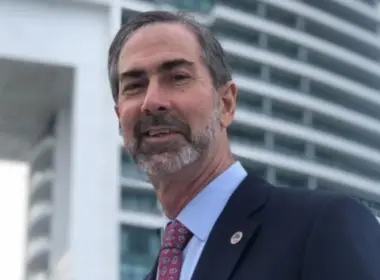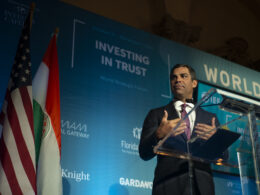A recent trip by the Miami’s private and public sector leaders underscores the potential trade growth with Japan
By J.P. Faber
The size and scope of the mission were sizeable, even for a Greater Miami Chamber of Commerce that is increasingly focused on international trade and investment: A 50-person delegation with a 10-day mission to Tokyo, Yokohama, and Kyoto. The entourage included a veritable who’s-who of local leaders, ranging from Miami-Dade Mayor Daniella Levine Cava and Miami International Airport Director Ralph Cutie to Beacon Council CEO Rod Miller and County Commissioners Juan Carlos Bermudez, Marliene Bastien, and Kevin Cabrera. On the private sector side, there were representatives from Teco Energy, Becker & Poliakoff, American Airlines, and PMI Global Services, to name a few. A total of 30 private sector representatives were on the trip, along with 20 government officials.

“Japan is one of our largest trading partners, so this was an important trip for us,” says Greater Miami Chamber President and CEO Alfred Sanchez, who was accompanied on the trip by the Japanese Consul General for Miami, Kazuhiro Nakai. “When the new Consul General [Nakai] came in, he was very engaged and really reached out to us as a chamber. He convinced us that there was a lot of opportunity with Japan.”
Already, Japan is Florida’s second largest source for merchandise imports, mostly consisting of automobiles and related products via Jacksonville, including auto parts re-distributed to Latin America. Trade with the Miami Customs District consists of higher value products, such as exports of medicines and aircraft parts, and imports of broadcasting equipment, watches, and video games. Altogether, trade between Japan and Miami should cross $1 billion when the full 2023 figures become available (total trade reached $925 million through November).

“Three years ago, the largest Floridian export to Japan was grapefruit,” says Japanese Consul General Nakai. “But this past year [2023] they were aerospace, pharmaceuticals, life science, or IT. By focusing on those areas, I’m convinced that we have more chances to further enhance trade and investment.”

Part of the mission to Japan, especially for public officials, was to look at how Japan has dealt with issues of concern for South Florida, among them transportation and sanitation. “We knew that Japan had a lot of technical advances in transit, for example, and we hoped they had solutions around waste,” says Mayor Levine Cava, for whom this was a first trip to Japan. “It far exceeded my expectations. There is no trash in Japan. They have solved their waste problem.” What surprised her the most, says Levine Cava, was the cleanliness. “You literally do not see a spec of garbage anywhere. People take their garbage home and sort it into 11 categories, and the incineration is extremely clean and efficient. They have landfills, but they consist of ash… also, waste plants and recycling plants are part of the community, with their own gardens, playing fields, and swimming pools heated from the incineration.”

Sanchez says he was also stunned by the sanitation practices, and the cleanliness of the cities – and the culture that eschews eating and drinking in the streets, and encourages people take trash home for recycling. “The other thing I was impressed with was the transportation. Hitachi showed us their battery train technologies… to electrify the mileage [of train tracks] is very expensive. But if you have [trains with] a quick-charge battery, you can save tens of millions in construction.” Says Miller: “The caliber of their transit infrastructure blew away anything I’ve seen.”
Another impressive display was the performance of their port technology. Part of the trip included a tour of the port of Yokohama, which like PortMiami is adept at moving cargo containers. “They’re extremely efficient in loading and unloading,” says Sanchez. “They can offload 55 containers per hour. We are no slouches, and we offload 35 per hour. So, we can learn from them.”
One of the tangible results of the trip was a signed memo of understanding with the Port of Yokohama, a sister port with Miami. “We wanted to double down on our relationship, and reunite it with an MOU,” says Levine Cava. “They were interested
in doing more at our port because of its connections with Latin America.” Indeed, Yokohama is the only Japanese port with direct routes to the U.S. East Coast and almost all U.S.-Japanese trade is by sea.
Also on the agenda were discussions to encourage direct flights from Japan to Miami, something which Consul General Nakai advocates. “This is indeed a priority that I am pursuing. Many people [think] a direct flight between Japan and Miami can be a game changer for investment and trade. It will further enhance momentum to our investments in Latin America and the Caribbean.”

What could accelerate JAL direct routes from Japan to Miami is that 2024 has been officially declared a U.S./Japan “tourism year,” one reason that U.S. Ambassador to Japan Rahm Emanuel participated with the Miami delegation. “The Japanese perception of Miami is quite outdated,” says Levine Cava. “They think of us as the beaches. But in terms of art and food and technology, they don’t know that this is a happening place.” Direct travel from Tokyo to Miami would go a long way to improve misperceptions.
Not all Japanese firms are blind to the potential for high tech investments in Miami. Of the more than two dozen Japanese companies operating in Miami, most are in tech, pharmaceuticals, transport, or logistics, such as Daikin, Nachi, Noven, Makita, Taichi and NSK. Hitachi Rail USA, for example, already manufactures Metrorail cars at a 140k sq. ft. plant in Medley, while Nipro Medical distributes surgical products from its warehouse in Doral.
For the companies that traveled to Japan, more than 20 percent say they expect to execute a business transaction within three months, and another 40 percent say they expect a business deal within six months, the result of an itinerary that included a flurry of meetings. “Besides getting a taste of their bullet train and downtown subways, we visited manufacturing facilities, pharmaceutical firms, and companies in fin tech, hospitality, and infrastructure,” says Miller of the Beacon Council. “For the Japanese relationships are very important and need to be cultivated. You can’t beat the importance of personal contact when it comes to creating business opportunities. So, this was a win-win, in every direction.” Already, at least one Japanese firm – SOMPO, a leading global provider of property and casualty insurance – has announced plans to establish operations in Miami.

As for the timing of increased trade and investment with Japan, Sanchez cautions optimistic Miami firms that patience will be needed. “Aggressive patience is the phrase that I would use,” he says. For the relationship to blossom, says Miller, a cultural adjustment will be needed. “I’ve been to a lot of different countries, but this was the most different. Their culture is ancient and not just a little foreign but very foreign…. The [business] leads are real, but there is going to have to be follow up, year after year, to make the transactions real.” Adds Levine Cava: “In Japan they are very deliberate and very thoughtful. What we accomplished will deliver results, but over time. Fortunately, we have a very active [ Japanese] Consul General here, and he was very excited for us to go, because he knows there is huge potential around trade and tourism.”












